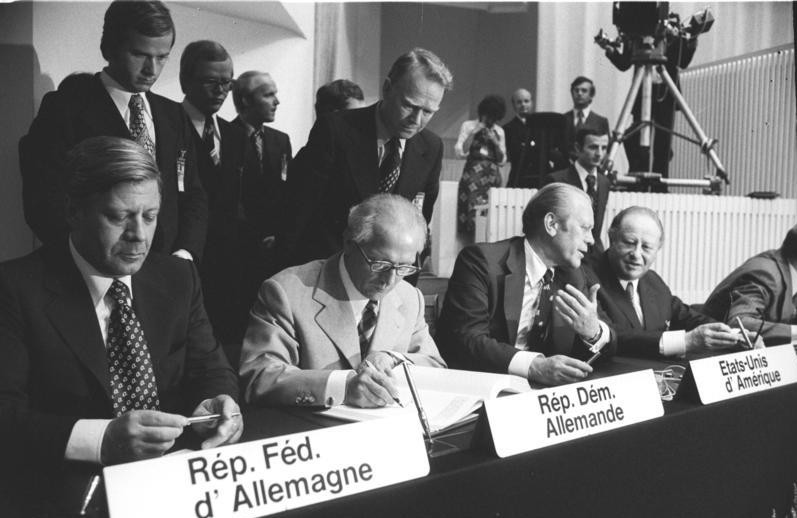Interview with Charlotte Waldraff: "Deutschmark Internationalization in the Times of Helmut Schmidt"

An interview with recent European History, Politics, and Society alum Charlotte Waldraff, about her MA thesis ‘Währungspolitik ist Auẞenpolitik’: Deutschmark Internationalization in the Times of Helmut Schmidt (awarded with program distinction).
What is the topic of your thesis?
In my thesis, I analyzed Helmut Schmidt’s resistance to Deutschmark internationalization during his time as Germany’s Finance Minister and Chancellor, spanning the years 1972 to 1982.
Why were you interested in exploring this topic?
International currencies have always fascinated me. They span the economic realm and that of foreign policy. They extend the jurisdiction of national agencies beyond national borders, creating a web of responsibilities and privileges. And they are crucial in determining the workings of the international monetary system.
The implications of international currencies, however, have a tendency to fade into the background, forgotten until some event crystallizes them. The Great Financial Crisis exposed the vulnerability accompanying dollar liquidity needs from non-US banks. The US stepping away from the JCPOA [Joint Comprehensive Plan of Action, aka "Iran nuclear deal"] revealed the influence the US dollar derives from being the currency of choice for trade denomination. These events are followed by lively discussions on whether a currency, usually the Euro or the Renminbi, could challenge the dollar’s position. Even when these discussions are triggered by geopolitical developments, they predominantly focus on the economic fundamentals required for currency internationalization. Is a Eurozone safe asset needed? Is the Chinese market sufficiently liquid?
The overlooking of the political nature of international currencies is not a modern phenomenon. It is also true of the academic discourse on German resistance to the growing international role of the Deutschmark, starting in the 1970s. The dominant narrative is that this resistance stemmed from concerns of inflationary pressures. This struck me as at odds with the complexity underlying international currencies, especially when in conjunction with a chancellor like Helmut Schmidt, who was uncannily well-versed in economic, foreign, and defense policy.
How did you conduct your research?
I began by diving into the economic theory and history of international currencies and the post-war international monetary system, with the works of Michael Bordo, Benjamin Cohen, and Barry Eichengreen being particularly instructive. Works on Helmut Schmidt, for example by Kristina Spohr and Johannes von Karczewski, allowed me to better understand his motivations and the political environment he was navigating.
Because very little had been unearthed about his views on Deutschmark internationalization, I headed to the Bundesbank Historisches Archiv in Frankfurt and the Helmut-Schmidt Archiv, located in Schmidt’s home in Hamburg. Since the Bundesbank and the federal government shared responsibility in currency matters, the Frankfurt archive was key to understanding the domestic debate. The documents showed the persistence and pervasiveness of resistance against Deutschmark internationalization within the Bundesbank. The accounts of meetings between the Chancellery, Finance Ministry, and Bundesbank as well as letters between the stakeholders shed light on how Schmidt’s views developed over time.
The Hamburg archive was helpful in two ways. First, preparatory documents for and protocols of international meetings spoke to the foreign political dimension of currency internationalization. Second, personal notes and letters allowed me to contextualize Schmidt’s official statements.
What are your main findings?
I argue that Schmidt’s resistance to Deutschmark internationalization, aside from inflation concerns, was two-fold. First, the importance he assigned to global economic stability made him wary of the relaxation of balance of payment constraints that comes with internationalization. Schmidt had experienced the demise of the Bretton Woods system and the accompanying economic volatility. He saw the source of this demise in America and its ability to prioritize domestic policy goals over its external balance. The special role of the US dollar freed it from adjustment pressures on its balance of payment deficits, allowing interest rate changes to be delayed.
Second, Schmidt was convinced that Germany’s historical burden and its vulnerability in the East required an anchoring of Germany within its Transatlantic and European partnerships. To him, they precluded the Federal Republic from positions of dominance. A direct foreign political use of its currency would have risked Germany’s isolation. That is not to say that Schmidt did not seek influence. When he pushed for the European Monetary System in the late 1970s, he recognized its potential to put pressure on the United States. He did not oppose this possibility, precisely because it was masked by the European cloak.
What makes this issue relevant today?
Of course much has changed since Schmidt’s chancellorship, most notably that European monetary policy is now decided on a supranational level whilst foreign policy is still largely in national hands. But as Schmidt always stressed, the two cannot be seen as distinct from one another. Germany, and the EU more broadly, needs to decide what role it wants to play on the geopolitical stage and which tools it is ready to use for this purpose. One possibility is a more global euro. However, economic and institutional reforms will not prove sufficient unless backed by foreign political ambition.
Charlotte Waldraff is an alum of the European History, Politics, and Society MA program at the European Institute, Columbia University.
The views expressed in this interview are those of the author and do not necessarily reflect the views of the European Institute.